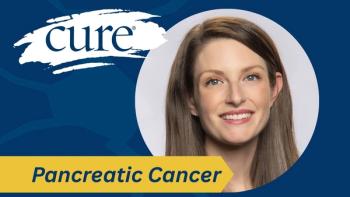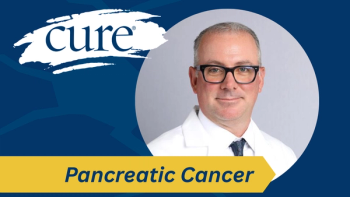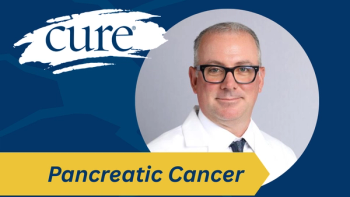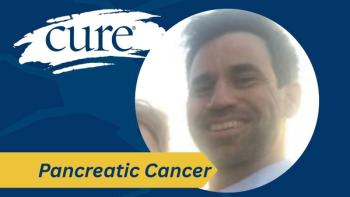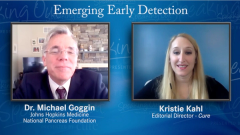
Raising Awareness
Kristie L. Kahl: Can you give background on the National Pancreas Foundation and its efforts?
Tom Birsic: So the National Pancreas Foundation was one of the first nonprofits that was created a little over 23 years ago, with the purpose of raising awareness in the community at large regarding pancreatic cancer and pancreatic disease, but with the real mission of not only raising awareness, but raising research dollars from the private sector to help fund young researchers and research efforts into pancreatic cancer and pancreatic disease.
We used to say pancreatic cancer was the fifth leading cause of death. People are becoming more aware of what a tough, hard disease this is. It was one of those orphaned disease that nobody really wanted to talk about, and nobody wanted to really think about it. And so it made it hard to raise money to fund research. And so that's why we thought when we got involved, that it was really important for us to structure the National Pancreas Foundation as a national organization. When we first were thinking about a foundation, some people can think very narrowly, and put their own name on it. But when you put a name like the National Pancreas Foundation, the idea in the model was to be more of a federal system where you would have different statewide chapters where people on a very localized basis, could have an impact in their own community, and come to the national platform for resources, and assistance, and help. And so that's kind of the way we've envisioned it in the way it's gone forward. And I think very successfully. You don't really start to understand something until you put a name on it and then you start talking about it. And you wake people up to what resources and help is potentially out there, if they're unfortunate enough to encounter this disease in their family.
Kristie L. Kahl: What is your mission in the pancreatic cancer space?
Tom Birsic: Our mission in the pancreatic space for the National Pancreas Foundation has several missions. At one point in time, our focus was on really addressing the cure rate. We have a great team of doctors in the National Pancreas Foundation, who know all the statistics. The statistics were bad, somewhere like 95% or 96% of people who were diagnosed passed away from the disease within a short period of time, within two years. And we had a goal at one time of really focusing on increasing that survival rate, start bringing it up a percentage. And I think right now, we're close to 10% survival rate. People don’t think moving from 94% to 90% is good, but they should talk to the 4% who are now alive today because of the research that has been supported in large part by the National Pancreas Foundation and other nonprofits in the same space.
And right now, I think that our mission is focused on pancreatic cancer, increasing the survival rate. We also have a very big focus on early detection and really trying to get people sensitized to the fact that early detection is really important. It really helps to increase people's survival rates when they are diagnosed early. We're a little bit unique, the National Pancreas Foundation, in that we not only have a focus on pancreatic cancer, but we also have an intense focus on pancreatic disease, in general, such as pancreatitis, and particularly a pediatric pancreatitis for young children who are impacted by that terrible disease as well. Our mission is broad, and we fund lots of research grants each year. That's a real important mission of ours from the very beginning. We run the organization, very leanly. We have 93% of every dollar that's contributed to the National Pancreas Foundation goes into programs and research.
Kristie L. Kahl: How can patients and family members learn more about the National Pancreas Foundation and how can they get involved?
Tom Birsic: Learning about them is as easy as going to the website, which I think we, in more recent years, have done a very good job of having a very good website, and exploring that website. And then reaching out to people at the national level. As I indicated earlier, we see ourselves as more of a federation as it were, because we have about 30 statewide chapters now. And those chapters are very much a reflection of the hard work of people in their own communities, and connecting with their own communities, connecting with nearby hospitals, and encouraging those hospitals to become centers of excellence, under the standards that are set forth by the National Pancreas Foundation. People want to connect in their own communities. And that is a very important mission of the NPF.
Right, we're not a top-down driven organization, we provide knowledge, resources and information at the national level, and hopefully support the good work of our chapters in their local communities. And that's very important because most of this is community-based. So if somebody has someone who's afflicted, and if you can get that person information, and you can raise awareness and you can help that person, get to the right physicians get to the right center, and get good nutrition information, which is on our website, and get good patient support. All of that is really critical and when you see people get involved, it's empowering for people to get involved in their statewide chapters. And if there isn't a chapter, start one, and ask us how they can start and get support from our great staff and team to have a local chapter. I find that so rewarding.
Kristie L. Kahl: To bring it all together, why is advocacy and awareness around pancreatic cancer so important?
Tom Birsic: I think that it really goes back to what I said before, and that is knowledge and awareness is power. It's empowering for people. And I think that the worst feeling in the world is when a person is diagnosed out of the blue with this disease or has a family member that's diagnosed with this disease and feels powerless. That lack of power, and that emptiness is palpable, in my experience, with this disease. And, you know, I can't tell you how many people over the years have contacted us…That is what awareness does, it empowers the patient. And it empowers the patient's family, for the tough fight that's ahead. And it is a tough fight. There's no doubt about that. But it's like all fights, you know, it's going to be a tough fight. And you've got to arm yourself up with knowledge and awareness at the earliest moment, and I think that's the value of advocacy and awareness. Advocacy for us at the NPF we're very involved with the federal government, the NIH. We can raise more funds and can direct funds in the right places a lot better. We will try to raise millions of dollars. The federal government can direct millions of dollars to the right research programs into the right places. And one thing the NPF does is get very organized in that regard. And we've got one of our co-founders and others within our organization who are really well placed. One thing that I always called the secret weapon for the National Pancreas Foundation over the years was that we have some of the best doctors in the world on our board…And even though we were a smaller organization, we didn't have as much money that gave us the critical edge of those doctors understanding what was going on in the pancreatic cancer field, and in the pancreatitis field, and directing our research dollars in the right place. It's like betting on the right horse is so important, and being able to provide what we call seed funding for key researchers who can then go on, once they get the grants from us, and go to the NIH, and get really big money that will allow them to go on and prove their research and prove out their theory. So, advocacy is really important. It's an important part of the mission of the NPF.





